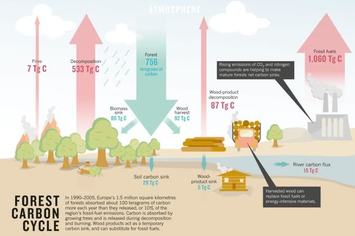Although 3 trillion might seem like a lot, human activity is compromising tree abundance worldwide and responsible for the loss of billions of trees annually. Since the beginning of modern agriculture 12,000 years ago, the number of trees on Earth has dropped by 46 percent, they said in the study.
Human population expansion responsible for tree-density depletion “The scale of human impact is astonishing,” says Thomas Crowther, an ecologist now at the Netherlands Institute of Ecology in Wageningen who led a study while at Yale University in New Haven, Connecticut. “Obviously we expected humans would have a prominent role, but I didn’t expect that it would come out as the as the strongest control on tree density.” “Crowther and his colleagues merged these approaches by first gathering data for every continent except Antarctica from various existing ground-based counts covering about 430,000 hectares. These counts allowed them to improve tree-density estimates from satellite imagery. Then the researchers applied those density estimates to areas that lack good ground inventories. For example, survey data from forests in Canada and northern Europe were used to revise estimates from satellite imagery for similar forests in remote parts of Russia,” they said. The highest tree densities, calculated in stems per hectare, were found in the boreal forests of North America, Scandinavia and Russia. These forests are typically tightly packed with skinny conifers and hold roughly 750 billion trees, 24% of the global total. Tropical and subtropical forests, with the greatest area of forested land, are home to 1.3 trillion trees, or 43% of the total, which includes the Amazon rainforest that is currently experiencing human encroachment and deforestation on a massive scale. Not all tree populations have the same environmental impact Susan Trumbore a biochemist at the Max Planck Institute for Biogeochemistry in Jena, Germany says, “The number of trees is just one piece of the puzzle,” says Trumbore. “A tree in the tundra is not the same as a tree in the rainforest.” “The number of trees is just one piece of the puzzle,” says Trumbore. “A tree in the tundra is not the same as a tree in the rainforest.” The amount of carbon the Amazon rainforest is absorbing from the atmosphere and storing each year has fallen by about a third in the last decade, reported in a new 30-year study by almost 100 researchers, according to the Carbon Brief. This decline in the Amazon carbon sink amounts to one billion tons of carbon dioxide - equivalent to over twice the UK's annual emissions, the researchers say. This further posits the greater significance of the rainforest depletion over the tundra. The latest numbers raise questions about which species are represented where and how particular forest types evolve. Crowther cautions that even though the latest figures do not change the current science on carbon storage or diminish the impact of deforestation. “We’re not saying, ‘Oh, everything’s fine’.” In fact, the work suggests that in some places where trees would be expected to thrive — such as warm, moist regions — human activities such as farming have largely pushed forests aside. Global forest sink and climate change mitigation The global forest sink is the ability of unharvested forests, for example, to absorb more carbon than they release. Environmental changes including naturally occurring phenomena, like weather events including droughts, together with human encroachment resulting in deforestation upset the natural steady conditions of absorption affecting tree populations. “To make good decisions about how to cultivate forests for climate-change mitigation, such as whether it is better to harvest or conserve trees, we must better understand the cause and future behavior of this in situ [in its original place] carbon sink. Until more is known, we propose that forestry management should prioritize 'win–win' strategies — those that increase both forest stocks and timber harvest, through measures such as protecting trees from animals, or replacing dying or low-productivity forests,” according to Nature Magazine. Finally, forest management techniques should be prioritized when possible, but these techniques only work if forests are managed methodically, not depleted to merely make room for expanding populations requiring more space for agriculture without considering the environmental impact in terms of balance between humans and preserving forests. Climate change, however, can be mitigated apart from the evolution of the global carbon sink by replacing dying or low-productivity stands, protection of young tree sprouts during harvesting, and planting resilient tree mixes that naturally nitrogen fix in the soil. Some of the strategies appear to be trial and error, but there is a method in the seemingly arboreal madness. Some scientists believe forest management is more of a “gamble than a scientific debate.” By following 'no-regret' strategies, they say we can buy time while we learn more. Clearly the formula for doing something instead of nothing is better. Sequester is a familiar, albeit scary, term lately in economics, but it also relates to the capacity of plants, trees, and grasses to move CO2 from the atmosphere through their roots into the soil, thus, removing it from the air mitigating climate change. Billions of acres of trees, no-till farm land, range land and forests can sequester enough CO2 to re-stabilize the climate. Maintaining and managing the planet’s 3 trillion trees is a powerful component to ensure their contribution in this vital process considering the expanding world’s human population which is projected to grow from the current 7 billion to 9.7 billion by 2050. Resources Nature Nature global count http://www.nature.com/news/carbon-sequestration-managing-forests-in-uncertain-times-1.14687 https://www.organicconsumers.org/news/carbon-underground-reversing-global-warming http://www.carbonbrief.org/blog/2015/03/amazon-rainforest-is-taking-up-a-third-less-carbon-than-a-decade-ago/
3 Comments
Eileen
10/9/2015 06:27:24 pm
Thank you Dava for a thorough report
Reply
Dava Castillo
11/9/2015 05:33:56 pm
Thank you for reading and commenting Eileen.
Reply
23/7/2017 04:11:26 pm
Bonsai's are a fantastic hobby to take up and can be enjoyed by young and old alike. You do not need to be a gardener to take up bonsai but to make sure that your bonsai will last for many years, you do need to know about bonsai trees care.
Reply
Leave a Reply. |
Dava Castillo
is retired and lives in Clearlake, California. She has three grown
children and one grandson and a Bachelor’s degree in Health Services
Administration from St. Mary’s College in Moraga California. On the
home front Dava enjoys time with her family, reading, gardening, cooking
and sewing. Archives
November 2015
|


